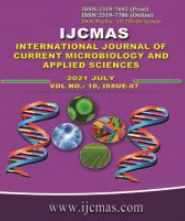


 National Academy of Agricultural Sciences (NAAS)
National Academy of Agricultural Sciences (NAAS)

|
PRINT ISSN : 2319-7692
Online ISSN : 2319-7706 Issues : 12 per year Publisher : Excellent Publishers Email : editorijcmas@gmail.com / submit@ijcmas.com Editor-in-chief: Dr.M.Prakash Index Copernicus ICV 2018: 95.39 NAAS RATING 2020: 5.38 |
Transfusion-transmitted infections (TTIs) continue to be a threat to safe transfusion practices. A total of 30 million blood components are transfused each year in India. Blood safety thus becomes a top priority, especially with a population of around 1.23 billion and a high prevalence rate of human immunodeficiency virus (HIV) in general population in India. Nucleic acid testing (NAT) in blood donor screening has been implemented in many developed countries to reduce the risk of transfusion-transmitted viral infections(TTIs). The objective was to assess the role of individual donor-NAT (ID-NAT) for human immunodeficiency virus-1 (HIV-1) its role in blood safety. It involves voluntary blood donors during period of one year from 1st June 2016 to May 2017 attending Chigateri Blood Bank, Davangere. Over a period of 1 year from 1st June 2016 to 31st May 2017, a total number of 9423 blood donor samples were subjected to test for HIV by Individual Donor Nucleic acid testing (ID-NAT), 9402 donors (99.8%) were negative by ID-NAT. 21 donors (0.2%) were positive by ID-NAT. Most of donors were in age group of 20-29 years & sex ratio of male: female was 70:1.Maximum donors belonged to O blood group. NAT could detect HIV cases in blood donor samples. Its widespread use in blood banks would ensure additional layer of safety in blood transfusion.
 |
 |
 |
 |
 |